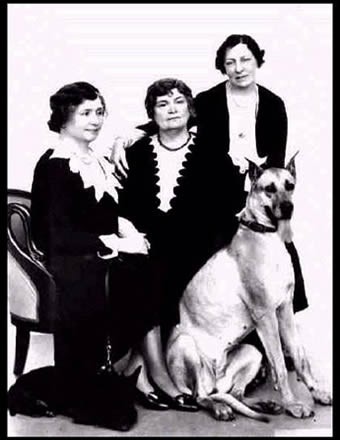Anne's Vision Deteriorates
This picture shows Helen Keller, Anne Sullivan Macy, and Polly Thomson, with dogs Darky and Helga, circa 1931. Helen and Anne are seated. Polly is perched on the arm of Anne's chair. Darky, the smaller dog, lies curled near Helen's chair. Helga, a very large dog with a light coat, sits in front of Anne and Polly, looking toward the camera. All three women are wearing black clothes—either dresses or suits—accented at the neck with white. Helen's collar is cut in a large sunray design that spreads out toward her shoulders and down to the middle of her chest. Anne's deep V neckline has a scalloped edge that contrasts sharply with the white fabric that fills in the V. Polly appears to be wearing a white blouse under a long-sleeved bolero jacket. All three look elegant. The New York Times Photo Archives.
Between 1927 and 1930, Anne's sight became significantly worse. As a result, she taught Polly the manual language so that she could take over the reading and daily workload. In May 1928, Anne struggled to help finish the last draft of Helen's biography Midstream, in which (to Helen's disappointment) Anne refused to let her mention Anne's traumatic childhood.
In June 1929, Anne's right eye was removed, and Anne, Helen, and Polly traveled to the Adirondacks for Anne to convalesce. However, people continued to flock around Helen and the women decided to travel abroad to recuperate. Anne's failing sight is described in Helen's book Teacher:
...The sorrow that oppressed me was the knowledge of her coming total blindness. She could not read with her naked eyes or with ordinary glasses. She was under the devoted care of Dr. Conrad E. Berens of New York who used to visit her often in the evening. He prescribed frequent drops and telescopic glasses of the double-lensed type. They weighed heavily upon her face, and because of this and the nauseating pain she could manage to read only for a short time before she was obliged to stop. Even a white tablecloth spread before her caused her acute distress, and candles and unshaded lamps pierced her eyeballs. At my earnest entreaty she did not read while Polly was visiting her family in Scotland. Somehow she got our meals, looking at the stove as little as possible, feeling the bread until it was toasted, and listening intently to the coffee as it simmered.
